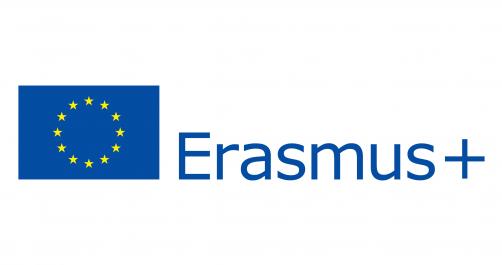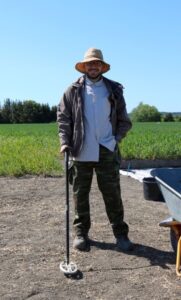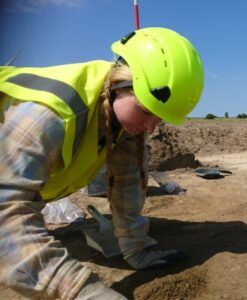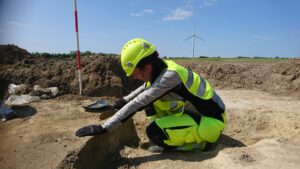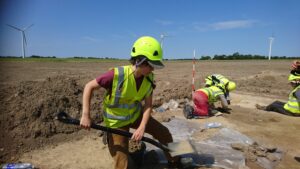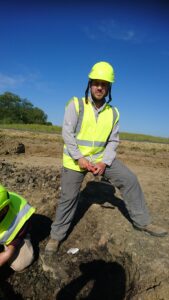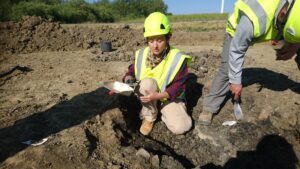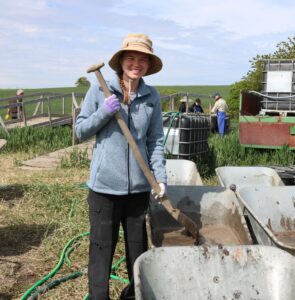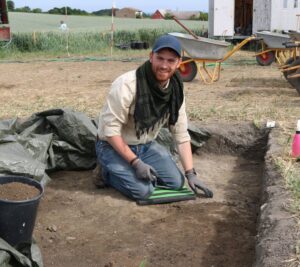From 2018, the Bornholm Archaeological Research Center will provide instruction and inspiration to scholars and students (graduate and undergraduate) as well as general public seeking self-enrichment. Interns will achieve success in professional positions in the cultural, arts and museum sectors. The relationship between the institution and the student is mutually beneficial; with guidance from museum professionals, Interns gain practical experience by working on projects and programs while the BARC and the Bornholm Museum benefits from their contribution.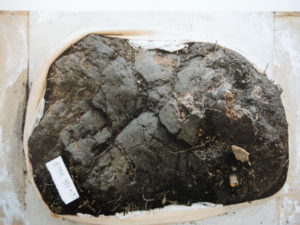
We offer a limited number of unpaid internships at BARC for current students and recent graduates during the academic year. These internships provide for the development of professional skills or research in a variety of fields and learning about museum practice.
In addition to focused learning through projects in various areas, students join a community of interns, volunteers and staff. All BARC interns have opportunities to attend gallery programs, presentations by staff, and behind-the-scenes visits.
Although the BARC does not offer direct economic resources for internships, the agreement done through its partner institutions allows students to apply for scholarships or grants through the Erasmus+ Program.
How to Apply
Submit a PDF or Word document via email to nc@bornholmsmuseum.dk including the following information:
- The area(s) at BARC that interest you, your academic interests and skills
- A short essay explaining why you want to be an intern at BARC.
- An unofficial transcript and a résumé (including references) describing your past work and internship experience.
Depending on the area(s) you select, you may be asked to submit a short writing sample.
Review Process
A selection committee composed of staff from relevant departments will review all applications.
Role Description
After being interviewed and accepted into the BARC’s internship program, Interns will meet with their supervisor to come up with a work schedule for the semester. Each internship will include a mix of specific projects and departmental work with interns encouraged to participate in the design of their projects. Internships are unpaid.
Equal Opportunity
The BARC welcomes applications from people from diverse cultural and linguistic backgrounds and people with a disability. If you have individual requirements that need to be accommodated in order to participate in the selection process and join the BARC, please indicate this in your application.
Curatorial Internship
Curatorial interns work alongside professional staff in the BARC and the BM. The department’s archaeological research and collections document the breadth, depth, and complexity of the Archaeological and Historical cultural history and World Heritage. Research sources include archaeological and historical objects, prints, photographs, and archives. Interns will have opportunities to work on a variety of projects which may include research, exhibition, and/or collections-related activities, depending on the nature of the assignment.
Projects
Some examples of duties include the combination of any the following activities:
- Photograph, describe, and document artifacts
- Assist with scholarly historical research for use in Museum publications, exhibitions, and public programs, using Museum and outside sources
- 3D register of the material from the collection
- Working on databases
- Respond to public inquiries
- Determine the provenance of artifacts
- Create and maintain databases of the collections
- Write finding aids and organizing guides
- Assist with accessioning, cataloging, numbering, and housing objects in the collections
- Assist with care and basic conservation of objects in the collections
- Review concept documents for exhibition development
- Prepare materials for fund-raising purposes
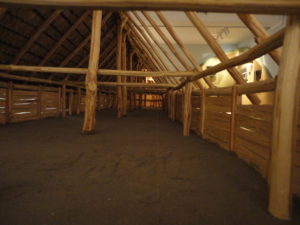
Qualifications:
A variety of skills are needed and can include any of the following:
- Knowledge of archaeology of the Baltic region, history of the Baltic region
- Knowledge of standard office computer skills, including database software and word processing
- Knowledge of specialized computer software, including GIS, CAD, Photoscan, Unity, SketchUp, Adobe Illustrator, InDesign, Acrobat Professional, Photoshop, QuarkXPress, FileMaker Pro,
- Library research skills
- Some experience with object handing, accessioning, or preservation
- Some experience with exhibition development
- Ability to work independently and on detailed tasks
- Archaeological background for work on collections
The Archaeological and curatorial office is primarily responsible for overview and enactment of executive strategic initiatives that impact office functions including collection stewardship, exhibition development, and management of other curatorial assets. New interns will work on staff management resources and training, programs for collaborative exhibition projects and research, and the creation of innovative development programs to support all curatorial work.
Applicants are strongly encouraged to consult the BARC-I.O., for further information.
Education and Public Outreach
The Department of Education and Public Outreach (DEPO) serves the BARC and BM’s audiences both on- and off-site, through education, exhibition development, public programming, visitor services, Web and social media, and evaluation. The department is actively involved in developing new ways to make history come alive through innovative outreach programs that will reach the widest possible number of visitors.
Interns work with DEPO staff and volunteers in a variety of capacities and on a range of tasks, including the following activities:
- Welcome visitors and present history in a variety of hands-on learning opportunities
- Wear historical costumes to promote specific historical themes or celebrations
- Participate in interpretive planning, exhibition development, and prototype testing
- Assist in development of school, teacher, and after-school programs
- Assist in creating and administering content for the BARC and BM’s website, blog, and social media (see Web and Social Media opportunities)
- Help to expand resources for object-based history for the Baltic Region.
- Research and prepare oral histories for permanent posting on the website by utilizing the Museum’s archives
Qualifications for the positions:
- Degree or expected degree in Europe history and culture, education, humanities, museum studies, museum education, music, communications, marketing, or a related field
- Demonstrated interest in museum programs, production, education, history, and/or marketing
- Strong writing, research, organizational, interpersonal, and computer skills
- Knowledge of desktop publishing software a plus
How to Apply
Interested students must go on BARC-I.O., website to apply online for this internship.
Qualifications:
- Excellent writing skills
- Familiarity with social media
- Basic knowledge of Europe ancient and modern history
Applicants are strongly encouraged to consult the BARC-I.O., for further information.
Erasmus+
Erasmus+ is a European Union programme that supports cooperation projects in the following three fields:
- Education and training
Mobility project for higher education students and staff (Credit mobility)
This mobility project can comprise one or more of the following activities:
Student mobility:
- a study period abroad at a partner higher education institution (HEI);
- a traineeship (work placement)abroad in an enterprise or any other relevant workplace.
A study period abroad may include a traineeship period as well.
To ensure high-quality mobility activities with maximum impact on the students, the mobility activity has to be compatible with the student’s degree-related learning and personal development needs. The study period abroad must be part of the student’s study programme to complete a degree at a short cycle, first cycle (Bachelor or equivalent), second cycle (Master or equivalent) and third or doctoral cycle.
Traineeships abroad at a workplace are also supported during short cycle, first, second, third cycle studies and within a maximum of one year after the student’s graduation. This also includes the ‘assistantships ‘for student teachers.
Wherever possible, the traineeships should be an integrated part of the student’s study programme.
Student mobility can be in any subject area/academic discipline.
For more details check:
—————————————
Name: Ditte Elisabeth Pelle Kofod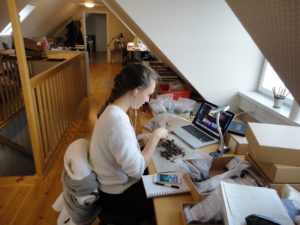
Institution: Prehistoric Archaeology at Aarhus University
Project: The project discusses the transition from Mesolithic to Neolithic, different analytical areas are included, which consist of location and topography, the cultural development as a society in an “island” and how these facts can prove undiscovered details about the Ertebølle-culture.
Period of internship: August – December 2017
Summary of the project:
In Autumn 2017 the student participated in an internship program at the Bornholm’s Museum in order to get an insight to the daily work at the museum, as well as activities related to projects in to the student’s ongoing master thesis.
The activities consisted of registering new material, taking photos of the objects and construct lists of finds, etc. The material was handed in by volunteers, who have processed the objects from different stone age locations at Bornholm. Particularly, the material was from Ertebølle sites which is the period the student has chosen to focus on her master – Ertebølle locations and where they are located in the landscape, in order to explain and discuss the importance of topography when searching for old as well as new stone age settlements.
The sorting and recognition of material was a great opportunity to strengthen the students’ knowledge of flint and ceramics, and other materials. Since some of the handed in material were not sorted before, it gave the student a chance to have the material in hands apart from learning from pictures and/or drawings. Besides sorting material, the student participated on prospections to see and learn about the landscape where known Ertebølle-locations had been excavated, all this in order to analyze the surrounding terrain. What’s interesting about the settlements is that prehistoric hunter/gatherers were always near to natural resources as water and forest, and these aspects that give archaeologists possibilities to discover new locations.
Final outcome:
- List of finds from Ertebølle-culture.
- Unfinished report – upcoming exam December 2017.
- Catalog and maps.
Name: Timmis Maddox
Institution: University of Wisconsin – Madison / Ph.D. Program
Project: A Longitudinal Study of Environmental and Cultural Sustainability
This project proposes an interdisciplinary analysis of the relationship between prehistoric urbanization on the Danish island of Bornholm and its effects on the physical environment. While not existing in a vacuum, the 227mi2 island of Bornholm presents a natural laboratory in which to archaeologically examine the environmental issues associated with urban development on a smaller scale and the possible solutions reached by past communities. Modern communities on the island are currently experiencing rapid development, with large growth taking place in both local agriculture and tourist industries as part of Bornholm’s “Green Island Initiative”. By understanding the problems prehistoric groups on the island dealt with as a result of the emergence and development of urbanization—including the transformation and degradation of the physical landscape—modern communities can be better prepared for similar issues they may encounter in the future.
If accepted, this project would act independently of the work currently being performed on the island of Bornholm as part of the ArchaeoBalt program. As a secondary project, however, this program would receive support from the Bornholm Archaeological Research Center—including access to records of previous archaeological surveys/excavations, the provision of basic supplies and equipment, and the availability of a trained labor force. Ultimately, both of these projects will benefit from the planned collaboration, as each would provide answers to questions concerning Sorte Muld and prehistoric Bornholm which neither could answer alone.
Latest publication:
A storm of swords and spears: The weapon dancer as an enduring symbol in prehistoric Scandinavia
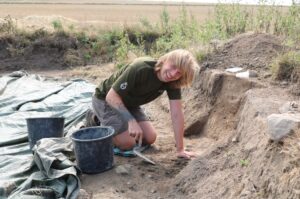
Name: Glenn Hedemann Petersen
Institution: University of Lund, Sweden.
Currently enrolled as a BA student with the Department of Archaeology & Ancient History in the Joint Faculties of Humanities and Theology at Lund University, southern Sweden (since 2018).
Glenn has taken courses in Runology, Anthropology of Religion, Old Icelandic Heritage and History of Religions and he has tried to approach archaeology from an interdisciplinary perspective, focusing his efforts in his BA-thesis on Female ritual specialists pertaining to the Late Scandinavian Iron Age. In his M.A., currently on progress, he writes on the symbology and agency of cauldrons in connection with pre-Christian Scandinavian death rituals and attempts to cross-reference archaeological sources with historical sources.
He has also taken a keen interest in folkloristics and ethnographic reports from various cultures across Europe, Asia and the Americas; he hopes to implement some of those studies into his topics of interest, which include ritual practice, funerary archaeology, and pre-Christian religions of the north.
From 2018 until present he has been a part of the Bornholm’s Museum summer excavations, which includes Store Bjerregård, Sorte Muld, Vasagaard East and West as well as Klippehøj. Recently he has been doing fieldwork at both Bjerregård and Sorte Muld, including sorting and registration of finds. Furthermore, he has through his studies participated in excavations in both Södra Sallerup and Uppåkra in Scania, Sweden.
Period of internship: May 12th – August 26th, 2021
Aristeidis Kourelis studied History, Archeology and History of Art at the University of Ioannina, from where he acquired his diploma in 2018. Currently he is a postgraduate student at the University of the Aegean, in the MA program of Archeology of the Eastern Mediterranean and his main areas of focus are Greece, Egypt and the Near East from the Prehistoric times until the Late Antiquity. He has participated in excavations in Greece and in Czech Republic regarding a wide range of different time periods, from Neolithic up to Greco-Roman period.
He joined the Erasmus internship program in order to participate with the Bornholm Archeological Research Center (BARC) and the Museum of Bornholm. Once the conditions related to Covid-19 allowed to travel, he participated in the Sorte Muld excavation project (ArchaeoBalt). His interest was to gained knowledge regarding to Northern European Iron Age time period and the methodology use in Danish archeology in their excavations.
The international character of the project and the bonding of the team allowed him to make some good colleges and friends. During the 8 weeks of excavation he was under the guidance and supervisors of the staff. He developed the necessary skills regarding the archeological process of a systematical excavation. After the excavation, he continued his traineeship at the BARC, there he acquired digital 3D documentation skills of finds as well as with an introduction into the GIS database of the museum.
Outcome:
- Technical report of the area of excavation he was in charge.
Institution: Institution of Archaeology and Ancient History at Uppsala University / Erasmus + Program
Project: Analyzing animal bones from Sorte Muld, understanding human-animal relationships, human diets and animal husbandry during Iron Age and how these are reflected on the material.
Project: Energiø
Period of internship: September 27th – December 12th, 2021 / May 13th – July 21st 2002/ June 2023
Summary of the project: The activities will consist of osteological analysis of bones from Sorte Muld, as well as writing an article about human-animal relationships, human diets or animal husbandry. The head-and-hoof burial in Sorte Muld is an interesting example of the role particular animals may have played in religious activities. Furthermore, animals have some connections to the environment, for example, the presence of boars, cattle and sheep speaks of an environment which were both damp and dry. Also, by looking at the age distribution of the bones you can get a better understanding if they were used for milk, meat or wool. By analyzing animal bones you can comprehend how extensively they were utilized, as seen in Uppåkra where the animals have been used very thoroughly. These aspects may give insights to the life, health and worldviews of people living in Sorte Muld.
Outcome:
- Category of animal bones documented to side, gender, age, species and bone element.
- Essay/article about animal husbandry/human-animal relationships/human diet.
Name: Abigail Marie MacEwan 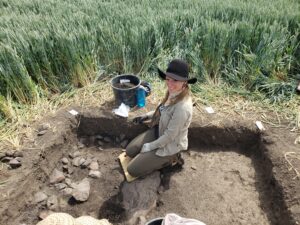
Institution: Harvard University – Extension School
Abigail is currently completing her undergraduate studies at the Harvard Extension School, where she is focused on Archaeology, Anthropology, and History. Abigail has participated in several archaeological projects and field schools, including studying abroad in Denmark with Aarhus University through the Harvard Viking Studies Program in 2018, as well as excavations throughout the United States.
Her archaeological experience in Denmark includes excavations at the Viking Age settlement site of Endebjerg on Samsø, in association with Aarhus University and the Moesgaard Museum (2018,) and at Sorte Muld in 2021 as a field school student through the Institute for Field Research.
Her research interests are currently focused on the extent of Sorte Muld’s significance during the Viking Age and the reasons for decline. She is also interested in Medieval weaponry, textiles, and the role of women within Viking Age society.
In addition to Archaeology, she has studied Medieval Literature, Art, and Architecture, as well as Scandinavian History, Sagas, and funerary practices.
Length of 2022 participation: May 31st to August 1st, 2022
Institution: Lund University / Erasmus+ Program
Project: Energiø Projekt
Period of internship: May-July 2023
Institution: Bryn Mawr College
Project: Energiø Projekt
Period of internship: June 2023
Willow Swidler Notte recently graduated from Bryn Mawr College with a bachelor’s degree in Medieval and Early Modern Studies. Before working as an intern with the Energy Island project, she excavated at Sorte Muld in 2022 as a field school student through the Institute for Field Research. Her first excavation experience was in 2021 at Joara and Fort San Juan, a Spanish fort and indigenous village in the foothills of the Blue Ridge mountains in North Carolina, dating to the beginning of the Spanish conquest.
Her particular interests are social history and the history of everyday life. She also has a bachelor’s degree in music, specializing in early music and historically informed performance practice.”
Name: Brett Pine
Institution: University of Lund
Project: Energiø Projekt
Period of internship: June 2023
Brett will be beginning his M.A. at Lund University in the fall of 2023 with the Department of Archaeology & Ancient History in the Joint Faculties of Humanities and Theology. In 2022, he graduated with a BA in Anthropology from Adelphi University.
During his bachelor studies, he took courses in Ancient Warfare, Forensic Anthropology, the Rise & Fall of Civilizations and Hellenistic Art & Archaeology. Using an ethnographic approach, he wrote his BA thesis about how archaeology was affected by the Covid-19 pandemic and how the field had abruptly changed. For his M.A. studies, Brett plans to study Viking Age settlement patterns and the cultural assimilation of Anglo-Saxon and Scandinavian people through the examination of everyday items such as tools, clothing, weapons and jewelry.
His archaeological experience includes contract bio-archaeological lab work in Manhattan, NY helping with the identification of adult skeletal remains and analyzing them for pathological diseases and traumas. Brett was also an archaeological lab assistant at SUNY Farmingdale State College. In 2022, he participated in the SUNY New Paltz Art History Symposium and Adelphi University’s 19th Annual Scholarship and Creative Works Conference where he presented his research “Skin Deep”: A Hellenistic Statuette of a Rider Wearing an Elephant Skin”. This research deals with a curious 3rd century bronze statuette of a nude rider in an elephant skin currently in the collection of the Metropolitan Museum of Art. Brett investigated the ethnographic, political and sociocultural implications of the iconographic tradition of depicting Hellenistic rulers with elephant skin. He also elaborated on the historical and cultural influence of the portrayal of elephant skin in Hellenistic society, and its relation to Alexander of Macedon. In June of 2022, he attended Sorte Muld field school as a student through the Institute for Field Research.
Brett has also studied Anthropological Theory, Religious Violence and Coexistence, Roman Civilization and Literature, and Native Americans of North America.
Institution: University of Glasgow
Project: Energiø Projekt
Period of internship: June 2023
Nysa N. Loudon is a Ph.D. candidate in the Department of Archaeology at the University of Glasgow. She is supported by funding from the Scottish Graduate School of Arts and Humanities AHRC Doctoral Training Partnership Studentship. Her project is entitled ‘The materiality, ecology, aesthetics of unusual plant fibres in prehistoric Eurasia.’ The research will endeavor to explore unusual and undomesticated plant fibers and their roles in prehistoric Eurasian peoples’ material lives through experimental and laboratory-based analysis. The research also hopes to elucidate the environmental lessons that these roles can instruct modern society on today. Loudon has a background as a sewist and costume designer in historical theatrical costuming and as a fiber artist. She holds a MSc in environmental archaeology from UCL, London, UK and a BA degree in anthropology and theater studies from Emory University, Atlanta, Georgia, USA.
Institution: University College Cork
Project: Energiø Projekt
Period of internship: June 2023
Olivia is currently finishing her MA in Museum Studies at University College Cork. As part of her program, she participated in two unpaid work placements at museums, one of which being at Bornholms Museum in 2023.
Olivia also has some archaeological experience on the island. She participating in an Institute for Field Research field school at Sorte Mold in 2021 while getting a BA in history at BYU-Idaho. She also spent a few days helping with the Energy Island Project in 2023.
Her internship at the museum involved working closely with a conservator to identify and record items that will be de-accessioned from the museum, mostly textiles and furniture. She hopes to enter the museum curation or archival career field once she has complete her master’s degree.
Length of 2023 participation: June 6th to June 30th.
Institution: Brigham Young University – Idaho
Project: Energiø Projekt
Period of internship: June 2023
Reef is a student at Brigham Young University-Idaho where he will earn his B.A. in History. His focus is in Archaeology and its applications to understanding world exploration and the connections made between foreign cultures. In 2021 these studies led Reef to participate in an archaeological field school aboard, working in Denmark at the Sorte Muld site. Reef returned to Sorte Muld in 2022, working as a volunteer, and in 2023 he interned through his university to help Bornholms Museum with the Green Energy Project. The Green Energy Project provided Reef with Cultural Resource Management training which furthered his technical skills within the field of archaeology.
Through his work at Sorte Muld, Reef became interested in the site’s significance as a center for far-reaching maritime trade and the origins of Sorte Muld’s many multicultural artifacts.
To expand his studies and to deepen his understanding of cultures, Reef has taken several language courses, including Spanish, German, Greek, and Arabic. His education allows him to recognize the influence that many cultures both had and still have with one another.
